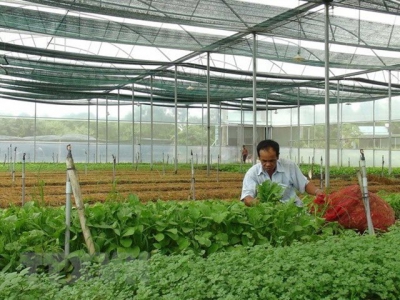Human resource training key to boost agriculture 4.0

A greenhouse vegetable cultivation model in Vietnam. (Photo: VNA)
Hanoi (VNA) – Minister of Agriculture and Rural Development Nguyen Xuan Cuong stressed the significance of improving human resource training to meet requirements of agriculture 4.0, which refers to farming practices that use technological advances of the Industrial Revolution 4.0 to increase productivity and sustainability.
At a workshop in Hanoi on July 4, the Minister said reforms should be made in vocational training and it is crucial to shift the focus onto practice capacity, core technique, as well as soft skill training in light of technological advancements.
New technologies essential for smart agriculture such as bio-technology, digital technology, automation, exact mechanics and new materials must be included in long-term curricula, he said.
Meanwhile, Minister of Education and Training Phung Xuan Nha underlined that curricula must be designed based on market demands. At the same time, foreign language and information technology (IT) play an important role in technology transfer and connections with corporations.
Currently, high-tech agricultural models have been applied in localities nationwide, particularly after Prime Minister Nguyen Xuan Phuc directed all ministries and branches to support smart and clean agriculture. Bac Ninh, Ha Nam and Vinh Phuc to Lam Dong and Kien Giang are leading the way in this field.
Vegetable, flower, shrimp and poultry farming models in those provinces have proven to have high-economic efficiency.
Pham S, Vice Chairman of Lam Dong province People’s Committee, said that the deployment of state-of-the-art technologies has created a breakthrough in improving quality of farm produce, giving local staples their own brands.
Developing smart agriculture, including both production capacity and production management, is key to ensuring economic efficiency and sustainable development in the context of global economic integration and response to climate change. Attention should be paid to measures to enhance production value chains and the value of agricultural products, according to Minister Cuong.
Related news
 Vietnam cashew industry: the more exports, the bigger losses
Vietnam cashew industry: the more exports, the bigger losses Vietnam is still the Number 1 cashew exporter in the world with 65 percent of market share, but cashew companies are facing problems such as lack of raw materia
 Tây Ninh links farmers, food firms
Tây Ninh links farmers, food firms Links between farmers and enterprises are weak in the southern province of Tây Ninh, making it difficult to add value to local farm produce
 Rice export upbeat in first half
Rice export upbeat in first half Vietnam’s rice exports saw remarkable growth in the first six months of this year, with year-on-year increases of 24.6 percent in volume and 42.2 percent